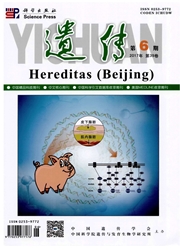

 中文摘要:
中文摘要:
MeCP2(Methyl CpG binding protein 2)基因突变可导致Rett综合征(Rett syndrome,RTT)。目前已报道的MeCP2敲除小鼠表型与RTT病人症状存在显著差异。为探索MeCP2在脑发育中的作用及其导致RTT的机制,本研究利用CRISPR/Cas9技术构建了MeCP2基因敲除大鼠模型。通过构建靶向敲除MeCP2基因的载体,体外将Cas9 mRNA和sgRNA显微注射到SD大鼠受精卵中,在MeCP2基因exon2中造成移码突变,从而获得MeCP2基因敲除大鼠。利用测序和Westernblotting方法鉴定MeCP2敲除大鼠,并对其表型和行为学特征进行分析,发现MeCP2敲除大鼠体重降低,存在焦虑倾向和认知缺陷。本研究成功构建了MeCP2基因敲除大鼠模型,其表型类似人类RTT患者的症状,为后续MeCP2功能研究提供了更好的动物模型。
 英文摘要:
英文摘要:
MeCP2 mutations are associated with the Rett syndrome(RTT).Currently,there is an urgent need for new animal models for RTT as the existing MeCP2 knockout mouse models fail to fully mimic the pathogenesis and symptoms of RTT patients.In order to investigate the role of MeCP2 in brain development and RTT pathogenesis,we aimed to set up the MeCP2-null rat model using the CRISPR/Cas9 technology.Firstly we constructed the MeCP2 targeting vector and then microinjected Cas9 mRNA and sgRNA mixtures into fertilized ova of SD rats.The sgRNA was designed to target the exon 2 of MeCP2.Next,knockout rats were confirmed using DNA sequencing and Western blotting.Lastly,phenotypes including growth and behaviors of MeCP2 knockout rats were analyzed.The results indicated that the MeCP2 knockout rats showed body weight loss,anxiety tendency and cognitive deficits.The MeCP2-null rat model established in this study recapitulates the major symptoms of RTT patients and provides an alternative tool for future studies of MeCP2 functions.
 同期刊论文项目
同期刊论文项目
 同项目期刊论文
同项目期刊论文
 期刊信息
期刊信息
